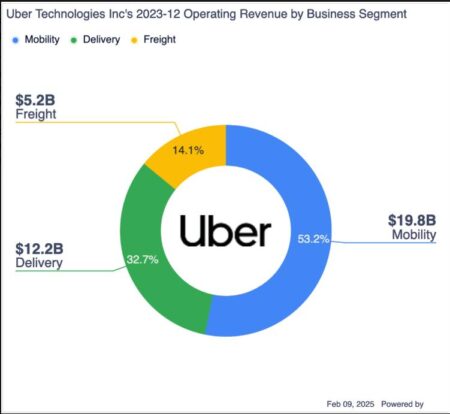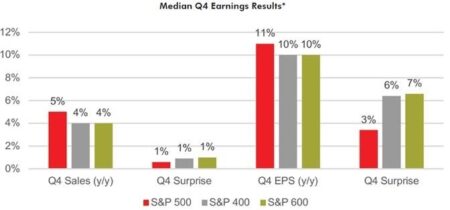Baidu Q4 Earnings Overview
Baidu reported Q4 2024 financial results after the close in Hong Kong and before US markets opened this morning. Expectations going into the release were muted, especially following Founder and CEO Robin Li’s absence from President Xi’s historic private economy symposium attended by internet and technology entrepreneurs. In Li’s defense, the event timing could not have been worse with today’s financial release and the preparation around it. People often ask us about Baidu as the stock has struggled lately despite its AI focus. Tuesday’s results provide one indication that financial metrics shrank year-over-year (YoY).
The company’s search business depends on advertisers, whose budgets have yet to fully recover from the pandemic, and, more recently, real estate’s effect on consumption and increased competition in app ecosystems. In the company’s defense, it receives no credit from investors for its AI Cloud, ERNIE large language model (LMM), or Apollo Go program, Baidu’s autonomous ride-hailing service, which provided 1.1 million rides in Q4. As of 8:30 a.m., management has not mentioned pursuing a Hong Kong dual share class, which would allow for Southbound Stock Connect flows.
Financial Highlights:
- Revenue fell by -2% YoY to RMB 34.1 billion ($4.675) versus an estimated RMB 33.4 billion and Q4 2023’s RMB 35 billion.
- Revenue from Baidu Core (Search) increased by 1% YoY to RMB 27.7 billion ($3.8 billion).
- Adjusted net income fell by -13% YoY to RMB 6.7 billion ($919 million) versus an estimated RMB 4.8 billion.
- Adjusted EPS fell by -12% YoY to RMB 19.18 ($2.63) versus an estimated RMB 14.24.
- Q4 share buybacks totaled $356 million, which brings the 2024 total to $1 billion and $1.7 billion since 2023.
Key News
Asian equities were largely higher overnight despite the U.S. dollar strengthening overnight. Hong Kong led the push higher on very high volumes, the Philippines and Pakistan outperformed, while Mainland China underperformed after afternoon profit-taking.
President Xi’s meeting with technology entrepreneurs Monday was still the talk of the town as Xi rarely meets with such executives. It indicates the economy’s need for private enterprises while lowering regulatory risks. Xinhua’s article only noted several attendees explicitly stating “Huawei’s Ren Zhengfei, BYD’s Wang Chuanfu, New Hope’s Liu Yonghao, Will Semiconductor’s Yu Renrong, Unitree Robotics’ Wang Xingxing, and Xiaomi’s Lei Jun put forward their opinions and advice on the development of the private sector.” The photos show that Alibaba’s Jack Ma and Tencent’s Pony Ma were there. The private sector focus raises expectations for next month’s dual sessions, the government’s big legislative meetings that set the budget and expenditures.
Although it was not widely broadcasted or discussed, the National People’s Congress (NStanding Committee will meet in Beijing on February 24t and 25t, in advance of the Dual Sessions, to “review the draft law on the promotion of private economy.”
The visual of internet CEOs standing in the same room as Xi led to a strong move overnight. As a result, Hong Kong’s most heavily traded stocks by value were Tencent, up +2.01%; Alibaba, up +3.36%; Xiaomi, up +7.2%; Meituan, up +2.37%, and Kuaishou, up +9.61%.
Hong Kong volumes were elevated, at 235% of the 1-year average, as Tencent’s value of volume traded was 6X higher than the previous record (5X for Alibaba 5X, 3X for Xiaomi, 2X for Meituan, and 2X for Kuaishou).
Southbound Stock Connect volumes were very high, with Mainland investors buying $2.88 billion of Hong Kong stocks, and Alibaba and the HK Tracker ETF were very large net buys.
Tuesday was the fourth largest net buy day ever for Southbound Stock Connect. On Monday, Mainland investors bought a net $1.4 billion worth of Hong Kong-listed stocks and ETFs via Southbound Stock Connect. Year-to-date, Mainland investors have bought nearly $24 billion worth of Hong Kong stocks and ETFs, versus $103 billion total in 2024. There have only been 17 days of +$2 billion since Connect started in November 2014.
Goldman Sachs’s well-respected portfolio strategist upgraded Hong Kong and Mainland Chins stocks on artificial intelligence momentum, emphasizing Internet stocks.
The disparity between Hong Kong and Mainland China’s equities is now nearly 15% YTD as Mainland investors continue to feel animal spirits. AI, growth, semiconductors, and technology plays were hit with profit-taking after news that Elon Musk’s xAI is updating its Grok 3 LMM. Mega-capitalization bank and energy stocks had a strong day, while the National Team’s favorite ETFs had near-average volumes, indicating there might have been some dip in buying from entities related to sovereign wealth.
Electric vehicle stocks, including CATL and BYD, which were up +0.51% and +2.22%, respectively, were another bright spot on the Mainland, as their CEOs attended the Xi meeting on an otherwise disappointing day. Ultimately, Mainland investors want to see significant policy stimulus, especially geared toward real estate. This can’t be done without a Trump trade deal. Let’s get it done.
I like to start my week with Renaissance Macro’s weekend podcast (also available on YouTube). I’ve never met Jeff De Graaf, Chairman and Head of Technical Analysis, though I followed his work during his Lehman Brothers tenure. The half-hour podcast is a concise look at the week prior and the week ahead through the facets of politics, economics, and market dynamics/technicals by De Graaf and his colleagues, economist Neil Dutta and D.C. policy expert Steve Pavlick. The Renaissance Macro team re-reiterated their positive view of Hong Kong stocks on both an absolute and relative basis. In my opinion, the podcast is a worthwhile listen.
The Hang Seng and Hang Seng Tech indexes gained +1.59% and +2.54%, respectively, on volume that declined -15% from yesterday, which is 235% of the 1-year average. 251 stocks advanced, while 233 stocks declined. Main Board short turnover increased by +11.94% from yesterday, which is 288% of the 1-year average, as 19% of turnover was short turnover (Hong Kong short turnover includes ETF short volume, which is driven by market makers’ ETF hedging). The growth factor and large capitalization stocks gained more than value and small capitalization stocks. The top-performing sectors were Information Technology, up +4.67%; Communication Services, up +2.3%; and Consumer Discretionary, up +2.29%. Meanwhile, the worst-performing sectors were Real Estate, which fell -0.38% and Energy, which fell -0.41%. The top-performing subsectors were technology hardware, media & entertainment, and consumer staples distribution. Meanwhile, commercial & professional services and steel were among the worst-performing subsectors. Southbound Stock Connect volumes reached 3.5x pre-stimulus levels, as Mainland investors bought a net $2.9 billion worth of Hong Kong-listed stocks and ETFs, led by the Hong Kong Tracker ETF and Alibaba, which were large net buys, Xiaomi, which was a moderate net buy, Tencent, Semiconductor Manufacturing, and Kuaishou, which small net buys. Meanwhile, Meituan, was a moderate net sell.
Shanghai, Shenzhen, and the STAR Board fell -0.93%, -2.02%, and -2.52%, respectively, on volume down -7.36% from yesterday, which is 160% of the 1-year average. 695 stocks advanced, while 4,409 declined. Growth and large capitalization stocks “outperformed”, i.e. fell less than the value factor and small capitalization stocks. Utilities were the only positive sector, up +0.11%. Meanwhile, the worst-performing sectors were Communication Services, which fell -3%; Information Technology, which fell -2.63 %; and Real Estate, which fell -2.38%. The top-performing subsectors were banking and highways. Meanwhile, education, leisure products, and web services were among the worst-performing subsectors. Northbound Stock Connect volumes were well above average. CNY and the Asia Dollar Index both fell versus the U.S. dollar. Treasury bonds fell. Copper fell while steel rose.
Live Webinar
Join us on Thursday, February 20th at 11 am EST:
A DeepSeek Driven China Internet Rerating?
Please click here to register
New Content
Read our latest article:
2025 China Outlook: A Recipe For Re-Rating
Please click here to read
Last Night’s Performance
Last Night’s Exchange Rates, Prices, & Yields
- CNY per USD 7.27 versus 7.26 Friday
- CNY per EUR 7.61 versus 7.60 Friday
- Yield on 10-Year Government Bond 1.70% versus 1.65% Friday
- Yield on 10-Year China Development Bank Bond 1.69% versus 1.65% Friday
- Copper Price -0.90%
- Steel Price +0.92%
Read the full article here
















